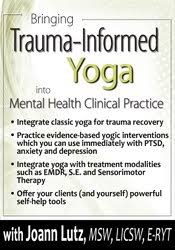Discover yoga-based interventions that can help regulate the autonomic nervous system and learn how to incorporate these interventions into your psychotherapy session.
Joann Lutz – Bringing Trauma-Informed Yoga into Mental Health Clinical Practice
Discover yoga-based interventions that can help regulate the autonomic nervous system and learn how to incorporate these interventions into your psychotherapy session.
In this recording, Joann Lutz, MSW, LICSW, E-RYT, teaches you an in-depth training on the principles and practices of trauma-informed yoga, with a special focus on chair yoga practices, yogic breathing exercises, and yoga nidra, the yogic sleep. This workshop also incorporates techniques and theory from trauma studies, somatic psychotherapy and ayurveda. Throughout the recording, you will learn the importance of nervous-system regulation to the process of psychological healing.
Learn first-hand why organizations as diverse as the U.S. Army and the U.S. prison system have embraced yoga as an evidence-based approach to treat post-traumatic stress disorder, anxiety and depression.
Through lecture, experiential exercises, video clips, and case studies, you will leave the workshop with the background and tools you need to add trauma-informed yogic interventions to whatever style of therapy you currently practice.
Evaluate ways that autonomic nervous system dysregulation contributes to PTSD symptoms.
Ascertain symptoms of post-traumatic stress disorder which can be decreased through trauma-sensitive yoga practice.
Practice trauma-informed chair yoga postures for use in the individual or group psychotherapy session.
Determine the benefits of bringing yogic deep relaxation into the therapy session.
Specify yogic strategies to reduce anxiety and depression.
Apply applications of chair yoga and three-part deep breathing practices into your clinical work, using scripts and practice sessions.
Would you like to receive Joann Lutz – Bringing Trauma-Informed Yoga into Mental Health Clinical Practice ?
The Yoga Tradition and Neuropsychology
Yoga, Patanjali and MRI’s
The importance of heart rate variability (HRV)
Yoga as a complete system of energy medicine
Embodied Psychotherapy
The Triune Brain: left out of traditional psychotherapy?
Regulating the brain’s trauma center
Tracking body sensation and breathing deeply
A frame of reference from Somatic
Psychotherapy
Neuroplasticity and interpersonal neurobiology
Applying Trauma-Informed Yoga Practices in the Psychotherapy Session
The evidence in evidence-based yoga practice
Yoga and polarities
Guided script for chair yoga:
5 trauma-informed chair yoga postures
Guiding and integrating the poses into your existing treatment modality (EMDR, Somatic Experiencing, etc.)
Chair trauma-yoga:
Tracking body sensation
Gaining self-mastery
Increasing self-regulation
Expanding present-moment awareness
Experience a chair yoga warm up and posture sequence
Yoga and the Breath
Respiration and the autonomic nervous system (ANS)
Breathing techniques to regulate the ANS and calm symptoms of trauma, anxiety and depression
Experience the three-part deep breath and script
Structure of the Embodied Psychotherapy Session or Group
Evaluating the client
Opening the session
Healing polarities:
Inner/outer
Sympathetic/parasympathetic activation
Sensing/action
Cognitive/somatic
Healthy symptoms of trauma discharge
Key points in making referrals to yoga classes
Therapeutic Value of Yoga Nidra (Yogic Sleep)
The benefits of sleeping while awake
Varieties of Yoga Nidra
Guided experience of Satchidananda’s Yoga Nidra
Discussion of Yoga Nidra script
Using Meditation
The relaxation response
Mindfulness meditation: open-focused meditation
A guided experience of both styles of meditation
The benefits of meditation in the trauma psychotherapy session
Case Study








